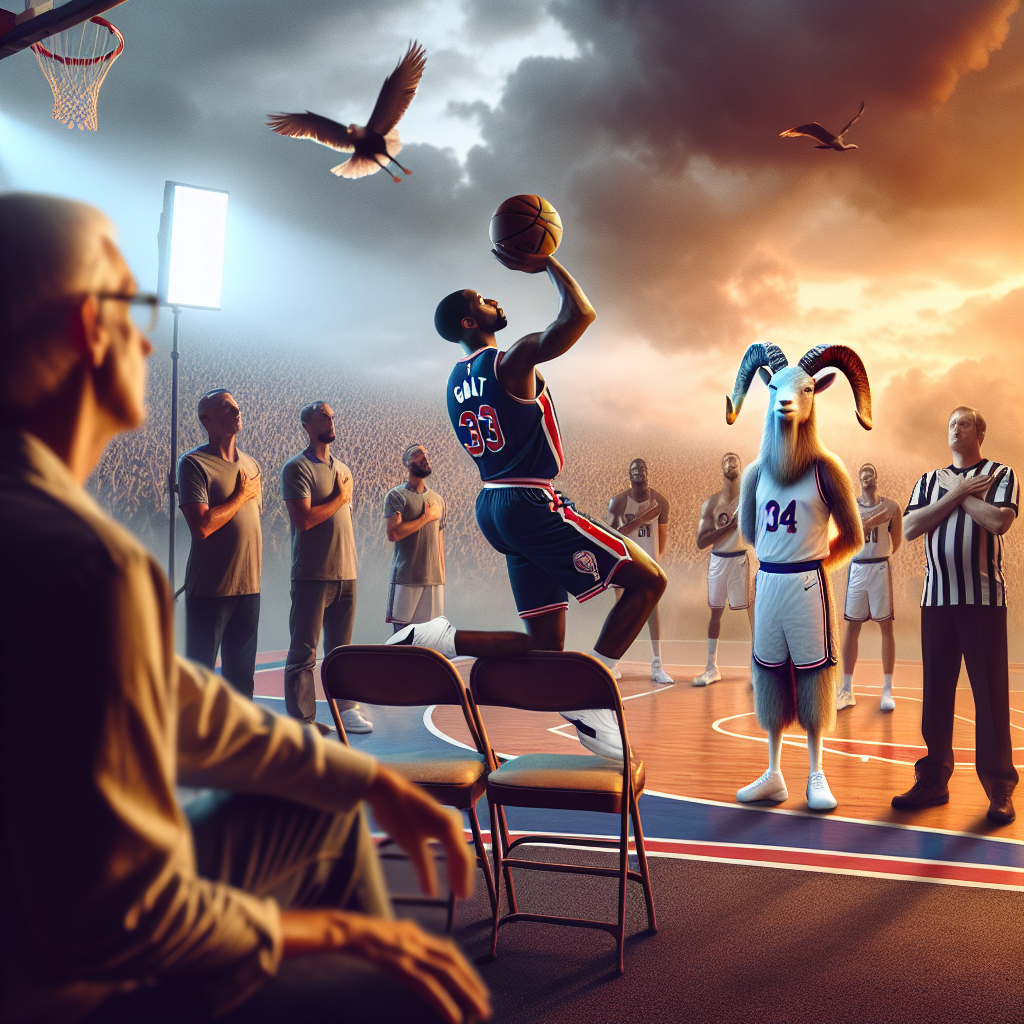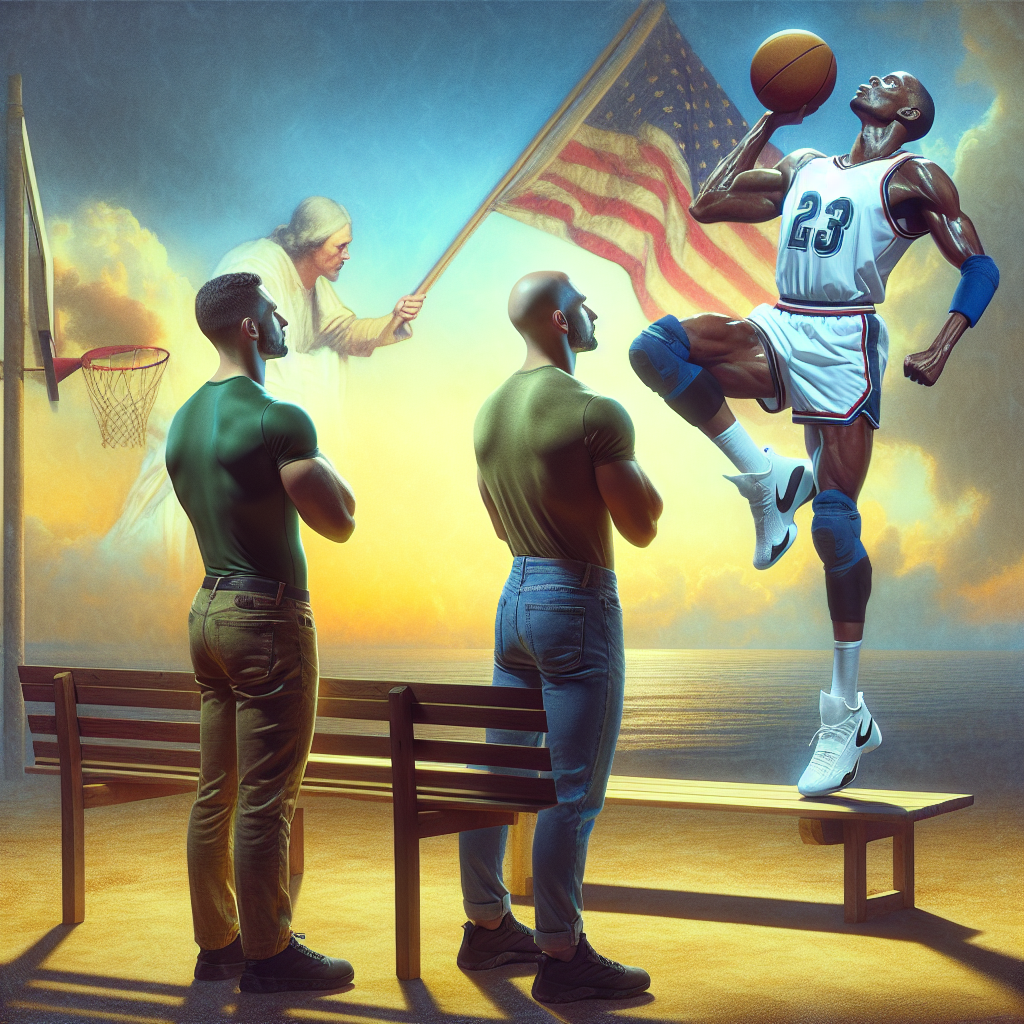Brandon Tatum nukes LeBron James for sitting during National Anthem: “That’s why MJ is the GOAT”

Brandon Tatum’s Fiery Critique of LeBron James: A Comparison to Michael Jordan
Brandon Tatum, a former police officer and conservative commentator, recently ignited a firestorm of controversy by criticizing NBA superstar LeBron James for sitting during the National Anthem. Tatum’s pointed remarks have sparked a broader conversation about patriotism, sportsmanship, and the legacy of athletes both on and off the court. In his critique, Tatum did not merely express disapproval of James’ actions; he also drew a stark comparison to another basketball legend, Michael Jordan, whom he hailed as the greatest of all time (GOAT).
Tatum’s comments came in the wake of a game where LeBron James chose to sit during the National Anthem, a gesture that has been interpreted by many as a form of protest against social injustices. While some view this act as a powerful statement against systemic issues, others, like Tatum, see it as a sign of disrespect to the nation and its symbols. Tatum argued that such actions undermine the unity and respect that the National Anthem is supposed to symbolize. He contended that athletes, given their influential platforms, should strive to bring people together rather than create further divisions.
Transitioning from his critique of James, Tatum lauded Michael Jordan for his approach to both basketball and public life. He emphasized that Jordan, during his illustrious career, never engaged in political or social protests that could be seen as divisive. Instead, Jordan focused on his performance on the court and his business ventures off it, thereby maintaining a neutral stance on contentious issues. Tatum suggested that this approach not only preserved Jordan’s universal appeal but also solidified his status as a role model for aspiring athletes.
Moreover, Tatum highlighted that Jordan’s commitment to excellence and his ability to transcend the sport have contributed to his enduring legacy. He pointed out that Jordan’s six NBA championships, five MVP awards, and numerous other accolades are a testament to his unparalleled skill and dedication. Tatum argued that Jordan’s focus on his craft, rather than on political statements, allowed him to achieve a level of greatness that remains unmatched.
In drawing this comparison, Tatum underscored the notion that athletes have a responsibility to their fans and to the broader public. He suggested that by avoiding political controversies, Jordan was able to unite people from diverse backgrounds, fostering a sense of shared admiration and respect. Tatum posited that this unifying effect is a crucial aspect of what makes Jordan the GOAT in the eyes of many.
However, it is important to recognize that Tatum’s perspective is not universally accepted. Many supporters of LeBron James argue that his willingness to speak out on social issues is a testament to his courage and commitment to justice. They contend that athletes, given their visibility and influence, have a duty to use their platforms to advocate for positive change. This view holds that James’ actions, far from being divisive, are a necessary part of the ongoing struggle for equality and fairness.
In conclusion, Brandon Tatum’s critique of LeBron James and his comparison to Michael Jordan have reignited a complex debate about the role of athletes in society. While Tatum champions Jordan’s apolitical stance as a model of excellence and unity, others see James’ activism as an essential contribution to social progress. This discourse reflects broader tensions in contemporary society, highlighting the diverse ways in which individuals interpret the responsibilities and impacts of public figures.
National Anthem Controversy: Brandon Tatum’s Take on LeBron James vs. Michael Jordan

In the realm of sports, few debates are as enduring and fervent as the comparison between LeBron James and Michael Jordan. This discourse, however, took a contentious turn when former police officer and conservative commentator Brandon Tatum criticized LeBron James for sitting during the National Anthem. Tatum’s remarks not only reignited the debate over the greatest basketball player of all time but also brought to the forefront the ongoing controversy surrounding athletes’ conduct during the National Anthem.
Brandon Tatum, known for his outspoken views on social and political issues, did not mince words when addressing LeBron James’ decision to sit during the National Anthem. Tatum argued that such actions are disrespectful to the country and its symbols, asserting that this behavior is one of the reasons why Michael Jordan remains the greatest of all time (GOAT) in his eyes. According to Tatum, Jordan’s era was marked by a different kind of professionalism and respect for national symbols, which he believes is lacking in today’s athletes.
Transitioning from Tatum’s perspective, it is essential to understand the broader context of this controversy. The act of sitting or kneeling during the National Anthem has been a polarizing issue in the United States, particularly since former NFL quarterback Colin Kaepernick first took a knee in 2016 to protest racial injustice and police brutality. This form of protest has since been adopted by numerous athletes across various sports, sparking a national debate on patriotism, free speech, and the role of athletes in social activism.
LeBron James, a prominent figure both on and off the court, has been vocal about his stance on social justice issues. His decision to sit during the National Anthem is seen by many as a continuation of his commitment to advocating for change and raising awareness about systemic inequalities. Supporters of James argue that his actions are a powerful statement against injustice and an exercise of his First Amendment rights.
However, critics like Brandon Tatum view such actions as a sign of disrespect towards the nation and its veterans. Tatum’s comparison to Michael Jordan is particularly telling, as it highlights a generational divide in how athletes approach their roles and responsibilities. During Jordan’s career, the expectation was often that athletes would remain apolitical and focus solely on their sport. Jordan himself was famously reticent to engage in political discourse, a stance encapsulated by his reported comment, “Republicans buy sneakers too.”
This contrast between Jordan’s and James’ approaches to activism underscores a significant shift in the sports world. Today’s athletes are increasingly seen as influential figures who can leverage their platforms to effect social change. This evolution has been met with both praise and criticism, reflecting the complex and often contentious nature of the intersection between sports and politics.
In conclusion, Brandon Tatum’s critique of LeBron James for sitting during the National Anthem and his subsequent praise of Michael Jordan as the GOAT encapsulate a broader debate about patriotism, activism, and the evolving role of athletes in society. While Tatum’s perspective resonates with those who prioritize traditional displays of patriotism, others view James’ actions as a courageous stand for justice. This ongoing dialogue highlights the diverse and often conflicting views on what it means to be a role model in today’s world, ensuring that the debate over the greatest basketball player of all time remains as dynamic and multifaceted as ever.
Why Brandon Tatum Believes Michael Jordan is the GOAT Over LeBron James
Brandon Tatum, a former police officer and conservative commentator, recently made headlines for his pointed criticism of NBA superstar LeBron James. Tatum’s remarks came in response to James sitting during the National Anthem, a gesture that has sparked considerable debate. Tatum’s critique, however, extends beyond this single act, delving into a broader argument about why he believes Michael Jordan, rather than LeBron James, should be considered the greatest of all time (GOAT) in the realm of basketball.
Tatum’s primary contention revolves around the notion of respect and professionalism. He argues that Michael Jordan consistently demonstrated a level of respect for the game, his teammates, and the country that LeBron James has failed to match. According to Tatum, Jordan’s unwavering commitment to these principles is a significant factor that sets him apart. This perspective is not merely about the act of standing for the National Anthem but encompasses a broader ethos of conduct and decorum that Tatum believes is essential for someone to be considered the GOAT.
Moreover, Tatum points to Jordan’s on-court achievements as further evidence of his superiority. Michael Jordan’s six NBA championships, five MVP awards, and ten scoring titles are often cited as benchmarks of excellence. Tatum emphasizes that Jordan’s ability to perform under pressure, particularly in the NBA Finals, is unparalleled. He notes that Jordan never lost in the Finals, a perfect 6-0 record that stands in stark contrast to LeBron James’ 4-6 record in the same setting. This statistical comparison, Tatum argues, underscores Jordan’s clutch performance and his ability to elevate his game when it mattered most.
In addition to his professional accomplishments, Tatum also highlights Jordan’s impact off the court. He argues that Jordan’s influence on the global popularity of basketball and his role in transforming the NBA into a worldwide phenomenon cannot be overstated. Jordan’s brand, epitomized by the iconic Air Jordan sneakers, has become synonymous with excellence and aspiration. Tatum contends that this cultural impact is a testament to Jordan’s unparalleled legacy, one that LeBron James has yet to fully match.
Furthermore, Tatum criticizes LeBron James for what he perceives as divisive political activism. While acknowledging James’ right to express his views, Tatum argues that Jordan’s more apolitical stance allowed him to unite fans across different backgrounds and beliefs. He suggests that Jordan’s focus remained steadfastly on basketball, thereby avoiding the potential alienation of any segment of the fanbase. This, Tatum believes, is another reason why Jordan’s legacy remains untarnished and universally revered.
In conclusion, Brandon Tatum’s argument for why Michael Jordan is the GOAT over LeBron James is multifaceted. It encompasses not only Jordan’s respect for the game and his impeccable professional record but also his broader cultural impact and unifying presence. While LeBron James’ talents and contributions to the sport are undeniable, Tatum asserts that Jordan’s holistic approach to his career and his ability to transcend the sport make him the true greatest of all time. This perspective invites ongoing debate, reflecting the enduring passion and complexity surrounding the question of who truly deserves the title of the GOAT in basketball.

